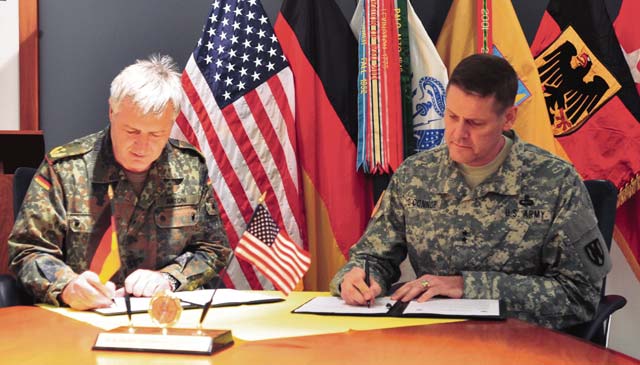
Maj. Gen. John O’Connor (right), commander of the 21st Theater Sustainment Command, and Maj. Gen. Hans Erich Antoni, commander of the Bundeswehr Logistics Command, sign a partnership memorandum between the two organizations March 5 on Panzer Kaserne. This was the first formal renewal of the U.S.-German military logistics partnership in almost 20 years.
Maj. Gen. John O’Connor, 21st Theater Sustainment Command commander, and Maj. Gen. Hans Erich Antoni, Bundeswehr Logistics Command commander, signed a Memorandum of Agreement March 5 at Panzer Kaserne. This event marked the first formal renewal of the U.S.-German military logistics partnership in almost 20 years.
The world was different 20 years ago. At that time, NATO involvement overseas focused on reforger missions. These Cold War-era exercises were conducted to ensure that NATO could deploy forces overseas quickly, if needed.
“Reforger exercises demonstrated NATO alliance resolve that countered communist threats to peace, freedom and prosperity,” O’Connor said.
“Today’s challenges, in what only can be described as an increasingly destabilizing global security environment, can best be tackled by identifying common ground among partners and by pursuing a mutually beneficial cooperation in selected areas,” Antoni said. “In our case, in the area of military logistics.”
The renewal of the partnership agreement comes at a time in which the Army is focused on improving military interoperability and capacity with partners and allies in Europe — a concept coined “Strong Europe.”
Formal NATO partnerships are central to the Strong Europe framework.
“They (help) educate, train and develop leaders, increasing readiness and enabling the alliance,” O’Connor said. “Our bilateral agreement testifies to the strength and power of our shared vision. Moving forward, we will forge strong teams while ensuring peace and stability throughout the region.”
After the signing ceremony, the official party toured a number of support centers for the 21st TSC, including the Theater Logistics Support Center-Europe, maintenance activity Kaiserslautern and the 6966th Truck Transportation Terminal.


